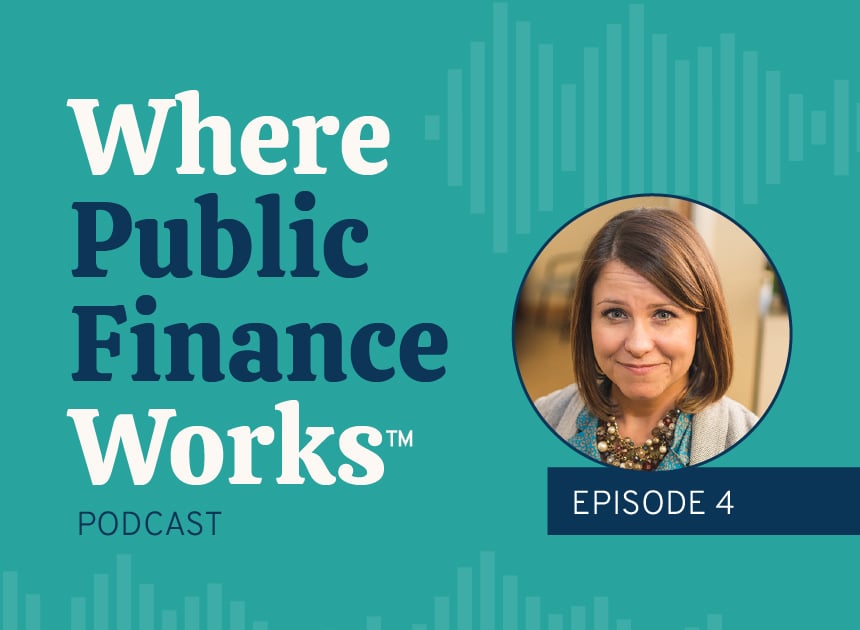Episode Summary
In this episode of Where Public Finance Works, we explore the intricate world of governmental accounting with Jamie Wilkey, a dedicated Partner at Lauterbach & Amen, LLP, boasting a remarkable 22-year journey within the firm. Starting as an intern and evolving into a firm partner, Jamie's story is one of growth, adaptability, and commitment to the public finance industry.
Join our host, Tyler Traudt, as he uncovers Jamie’s approach to the evolving GASB standards and the crucial balance between clear communication with external stakeholders and manageable operations for local governments. Jamie's take on the future of public finance functions, including the significance of efficient technology tools and the need for early education in public finance, is especially important for listeners in the public finance space.
Jamie's story isn’t just about numbers and audits; it's about strengthening firm culture, adapting to changing standards, and the relentless pursuit of progress in public finance.
Featured Guest
Jamie Wilkey holds a remarkable tenure of 22 years at Lauterbach & Amen, LLP. As one of the first seven members of the firm, Jamie began as an intern before becoming a vital part of the firm’s leadership as a partner.
With over two decades of professional experience in the governmental sector, Jamie has made significant contributions across a wide range of governmental engagements. Her expertise includes municipalities, park districts, school districts, libraries, special districts, and various other governmental units. Her initial focus was in the audit space, where she provided annual audits to local governments, ranging from large entities to small pension funds.
Currently, Jamie's role has evolved into both client and staff management. Her days are largely spent overseeing the firm's operations, but her true passion lies in working directly with clients, educating staff, and nurturing the development of a core group of professionals in the public finance space.
Top Takeaways From Episode Four
1. The evolution of leadership and firm culture in public accounting: Jamie shares insights into her leadership role, highlighting the significance of leading by example. Her discussion about maintaining a cohesive firm culture, especially during the challenges of COVID-19, sheds light on the need for strong leadership in times of change.
2. Adapting to evolving GASB standards: With GASB's new leadership focusing on analyzing the cost-benefit of new standards, Jamie discusses the ongoing challenge of implementing existing standards, like those related to compensated absences. Jamie shares the need for full transparency to satisfy external stakeholders, while not being a burden to the local government.
3. The impact of technological advancements and education in public finance: Jamie talks about the importance of understanding and using ERP systems to improve efficiency and operations. She emphasizes the need to start conversations about public finance at the high school level, advocating for early exposure to these career paths to address the current talent gap in the field.
Public Finance Insights
[1:29] Jamie decides to change from a psychology major to pursue a career in finance and accounting: During her sophomore year of college, she receives an internship at Lauterbach & Amen, LLP, despite the firm's initial reluctance to take on an intern.
[5:05] She discovers Lauterbach & Amen is in an often overlooked sector - servicing government clients in finance and accounting: The firm’s dedication to their government clients fuels Jamie’s passion in this field. By continuing her career with the firm, she is able to fulfill her own desire to help people, since public finance involves serving others.
[7:04] Jamie’s work for the firm leads to a full-time job offer before her senior year of college: Despite her advisor's suggestion to explore other opportunities, Jamie chooses to stay with the firm, believing in its potential. She highlights her early time as the seventh employee, in comparison to the firm's significant growth to over 250 employees.
[7:56] After starting in audits, Jamie earns a partnership with the firm where she focuses on annual audits for local governments ranging from large entities to small pension funds: Around the time of her partnership, Jamie notices a talent shortage in the government sector. Despite reduced productivity, the demand for strategic financial services like projections and cash flows increases.
[11:07] Jamie reflects on her transition from being a subject matter expert to focusing on running the business with an emphasis on firm culture: During this time, she learns the importance of creating a work environment where employees are happy and convey this positivity to clients.
[13:25] When the COVID-19 pandemic strikes, the firm has to transition to a hybrid work model due to the continued operation of most of their governmental clients: Jamie recalls that many of their younger staff were eager to return to the office, due to the isolation of working alone in apartments. She details the difficulty of maintaining the firm's culture when the team was not physically together and how they came up with a plan to keep everyone connected.
[15:36] Jamie talks about the principles of Lauterbach & Amen and their goal to meet any need that a government client might have: She explains how with a dedicated team of 250 people focused solely on the government sector, the firm has built a model of flexibility where clients can easily access financial experts without needing to invest in internal training or developing institutional knowledge.
[18:21] Challenges arise when trying to source new talent: Jamie discusses the competition for candidates from a limited pool, which becomes even more constrained when considering the niche of governmental accounting. As a result, many governmental organizations are experiencing a turnover in key financial positions, with many new directors and managers lacking tenure.
[20:48] Government boards and councils often hesitate to allocate taxpayer funds for succession planning which leads to big issues in the public finance space: Jamie discusses how many parties do not fully grasp the complexity and demands of finance roles in government. She suggests that shifting perspectives or enhancing education about the value of strong financial leadership could benefit government organizations.
[26:58] Jamie discusses the future of governmental finance functions, predicting significant changes over the next decade: She suggests that the focus should be on education about technology and automation, aiming to alleviate finance professionals from mundane tasks.
[31:08] Jamie speaks on the future developments and challenges related to GASB standards: She suggests that GASB and other organizations are considering ways to streamline reporting and standardize account setups across different governments to ease inefficiencies. This uniformity would be beneficial as it would allow finance professionals to transfer between organizations without the need to relearn different systems, thus being immediately effective.
[36:40] Jamie considers how public finance employees should pitch their job in this unique industry: She believes that increasing awareness and conversation about public finance and accounting at an earlier stage is crucial, as these discussions are currently not prevalent.







.jpg)
.jpg)
.jpg)
